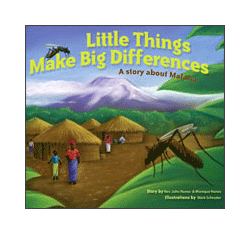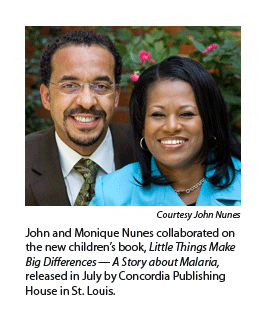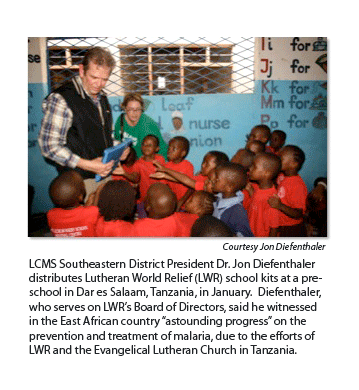By Paula Schlueter Ross
Little things can make big differences — especially when it comes to preventing malaria.
That’s the message of one of those “little things” — a 32-page children’s book from Concordia Publishing House that’s written by Dr. John Nunes, president and CEO of Lutheran World Relief, Baltimore, and his wife, Monique, an administrator at Baltimore Lutheran School.
The book, Little Things Make Big Differences — A Story about Malaria, is the true story of a family in Tanzania, East Africa, and their experience with malaria. Even the illustrations, by Mark Schroder of Denver, are real-life depictions, based on photographs of the family’s home and village.
Released in July, Little Things Make Big Differences was written “to get out the message of what malaria is, what it does, and how we can actually make a difference,” says John Nunes.
Although the book is written for children ages 5 to 12, adults also can learn from 11-year-old Rehema, who describes life in Tanzania and relates the story of how she contracted malaria when she was a baby and almost died — all because she was bitten by an infected mosquito.
Now she and her family sleep under mosquito nets and are learning about the efforts of U.S. Lutherans to eradicate the disease, which has killed half of all the people who have lived in the history of the world, according to Nunes.
The family of Bishop Walter Obare of the Evangelical Lutheran Church in Kenya (Obare preached at the installation of LCMS President Rev. Mathew C. Harrison in September) was hit hard by malaria. Ten of Obare’s 14 siblings died of the disease.
And, perhaps a surprising fact: The Centers for Disease Control in Atlanta was founded in 1942 to fight malaria in the United States.
Today, malaria is a largely preventable disease that’s “intensified by poverty,” Nunes says, because many people in developing countries do not know how to prevent it or are too poor to buy bed nets and medicine. It’s also a disease “that we can totally do something about,” he adds.
Nevertheless, malaria continues to take the lives of nearly a million people on the continent of Africa every year, or one person every 45 seconds. 
Most victims are children under the age of 5 — a statistic that Nunes finds particularly distressing since his oldest daughter lost her unborn child last February during her eighth month of pregnancy.
It was “heartbreaking,” he said, having to bury his granddaughter, but even worse watching how painful it was for his daughter.
So, how sad is it that so many mothers around the world are watching their own children die “from something that we can do something about?” he asks.
“As people of faith,” he says, “I believe that God has called us to use the blessings that we have — which are incredibly many — to make a difference in the lives of others.”
One hundred percent of the proceeds from the sale of Little Things Make Big Differences go to the Lutheran Malaria Initiative (LMI) — a partnership of LWR and the LCMS to raise $45 million and eliminate malaria deaths in Africa by 2015.
Nunes says he is hoping that every LCMS congregation, Sunday school and elementary school will get involved in the effort. A donation of $10 to LMI provides one insecticide-treated mosquito net for someone in Africa. LMI funds also will be used to treat those who have malaria, and to educate families about preventing the disease.
“Restoring health and inspiring hope is what the LMI is all about,” says Nunes, and that goal goes hand-in-hand, he says, with LWR’s mission to “end poverty, injustice and human suffering.”
Taking aim at malaria right now is especially beneficial, he says, because others also are targeting the disease. The Evangelical Lutheran Church in America has launched its own anti-malaria campaign, and the Bill and Melinda Gates Foundation also is working to eradicate the disease.
The initiative has been selected as the official mission project of Concordia Publishing House’s 2011 vacation Bible school, “Big Jungle Adventure,” which includes information about malaria and LMI, and offers a decorative mosquito net to help students visualize how the project is helping.
In an LMI pilot project earlier this year, the Synod’s Southeastern District asked several of its congregations to consider taking part in the initiative.
“All readily agreed to do so,” said the district’s president, Dr. Jon Diefenthaler. One of the district’s elementary schools — which was in the process of closing and did so in June — asked each of i ts 36 students to raise $10 “for a bed net that would save the life of a child like themselves in Africa,” according to Diefenthaler. “They easily exceeded that goal,” raising enough money to purchase 50 nets, he said.
ts 36 students to raise $10 “for a bed net that would save the life of a child like themselves in Africa,” according to Diefenthaler. “They easily exceeded that goal,” raising enough money to purchase 50 nets, he said.
Diefenthaler, who serves on the LWR Board of Directors, spent two weeks in Tanzania last January and “observed the astounding progress being made on a project for the prevention and treatment of malaria in which LWR was partnering with the Evangelical Lutheran Church in Tanzania.
“Through the network of parishes in this African Lutheran church body, 1.7 million people have been reached,” Diefenthaler told Reporter. “The experience also confirmed my conviction that Lutherans in our land — if we participate in LMI and succeed in helping people reduce the one-million-person annual malaria death toll — will get the attention of people who are on the margin or living apart from the church.
“For it will be in us and through our LMI witness that the Spirit of God may lead them to Jesus for whom so many are still searching.”
For more information about the Lutheran Malaria Initiative — and how you can get involved — visit www.lutheranmalaria.org.
To order Little Things Make Big Differences — A Story about Malaria ($6.99, item no. 562460WEB), call CPH at 800-325-3040 or visit www.cph.org. Price quoted does not include shipping charge.
Updated Oct. 22, 2010



